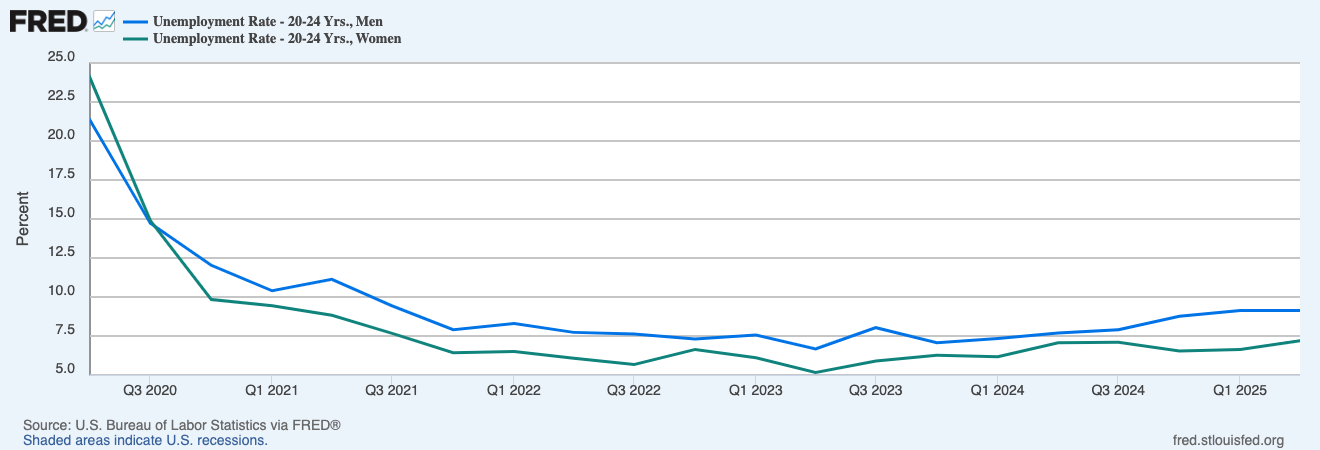- Millions of U.S. Gen Zers are not in employment, education, or training, but American men are struggling to find opportunities more than women are. Currently 9.1% of men ages 20 to 24 are unemployed compared to just 7.2% of women, a gap that’s persisted since the thick of the pandemic. As more women funnel into AI-proof industries like health care, men are still on the hunt for jobs in tech and financial services slowly being overtaken by automation.
Gen Z is stepping out of college and into a fierce labor market, up against slower payroll gains, “ghost” jobs, absent hiring managers, and dwindling entry-level job openings thanks to AI. It’s caused millions of these young workers to be frozen out of new opportunities, and men are largely the ones being impacted.
Although Gen Z men and women face the same labor market hurdles after college graduation, young male professionals have continued to be unemployed at higher rates. For years they’ve struggled to keep up with their female peers who have skyrocketed past them in education and work. In the first quarter of this year, 9.1% of men ages 20 to 24 were jobless, compared to just 6.6% of women in that age group, according to a FRED analysis of U.S. Bureau of Labor Statistics data. And the trend continues, with 9.1% of Gen Z men being jobless in the second quarter of 2025, compared with only 7.2% of women. Young female professionals have continued to have an edge on their male counterparts, being employed at rates 0.6% to 2.5% higher over the past five years.
Jobless rates for these young Gen Z graduates seemed to switch in the third quarter of 2020—in the thick of lockdown—after men previously saw lower unemployment than women. And post-pandemic, the unemployment rates have continued on the trend. The change also occurred two years before pioneering tech company OpenAI released ChatGPT in November 2022.

Finding a gig across many industries has been dire. White-collar hopefuls have been sending out over 1,700 job applications, with many applying to companies for over a year with no luck. But men might be having a tougher go at nailing down a job because they’re skipping over one key recession and AI-proof industry: health care.
One key industry men aren’t funneling into: health care
Computer science jobs were once the hot ticket to six-figure salaries, and men in particular were funneling into the industry, hoping to make big bucks in tech. But now these high-paying coding and engineering roles are on the wane, thanks to AI automation. Meanwhile, women have continued pouring into health care, an industry they’ve historically dominated, which is better protected against AI jobs disruption and recessionary impacts.
In fact, home health, doctor, and nursing job postings have seen a combined 162% growth rate since pre-pandemic, according to 2025 data from Indeed. Physician and surgeon roles represented the greatest boost in the field, as open spots have skyrocketed 90% since pre-pandemic years.
By contrast, computer-programmer employment recently dropped to its lowest level since 1980. Unlike jobs predominantly occupied by men—including coding or financial services—an AI bot can’t be trained to take over their daily tasks like sterilizing surgical equipment. In 2021, 16.4 million women were employed in the health care and social assistance industry: 77.6% of the total 21.2 million workers in the industry, according to the BLS.
“Health care is a classic recession-resistant industry because medical care is always in demand,” Priya Rathod, career expert at Indeed, told Fortune. “During the 2007 to 2009 Great Recession, health care employment continued to grow even as overall U.S. payrolls shrank.”
And because of America’s rapidly aging population, there’s no shortage of these jobs on the horizon. Older citizens are driving the need for services like home health, personal care, surgeon, and physician roles, and health care employment is expected to swell by roughly 1.9 million job openings annually over the next decade, according to BLS data.
Fewer white-collar jobs for graduates and the rise of NEETS
Young unemployed men are falling into a bucket of entry-level professionals checked out of the labor force and education. In 2022 there were roughly 4.3 million jobless Gen Z NEETs in the United States: not in employment, education, or training. But the issue spans internationally, as roughly a fifth of people ages 15 to 24 globally fall in that designation, according to the International Labor Organization. (Separate data from BLS show that there were 2.5 million unemployed people last month in the 16–24 age range.)
Even when they follow the traditional path for success—going to college, and applying for steady white-collar roles—the glimmer of four-year degrees seems to have faded.
The unemployment rate among recent college graduates is climbing, hitting about 4.8% in June, according to data from the Federal Reserve. And college diplomas seem to be losing their edge; men with a college degree had roughly the same unemployment rate as young men who didn’t go to college, according to a Financial Times analysis of U.S. Current Population Survey data. This is why many young people have turned to blue-collar work as a way to skirt costly college degrees, land a guaranteed job, and still earn six figures.
“In many cases, young people have been sent off to universities for worthless degrees, which have produced nothing for them at all,” British podcaster Peter Hitchens said of colleges in March. “And they would be much better off if they apprenticed to plumbers or electricians; they would be able to look forward to a much more abundant and satisfying life.”











